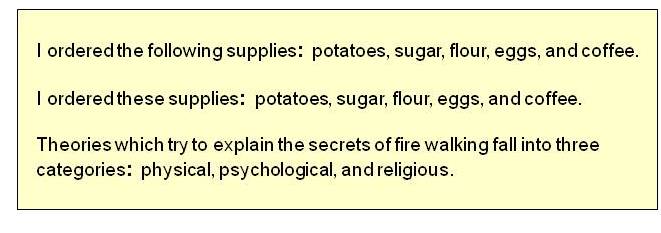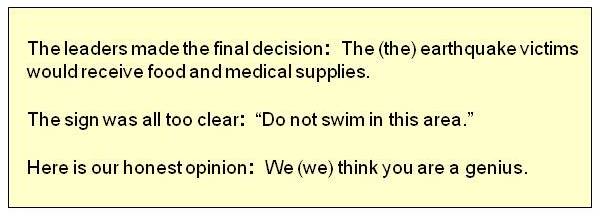
Can you name the figurative language device?
Coming up: assessment on semi-colons and commas on Monday, January 8; vocabulary quiz on Wednesday, January 10.
In class: Please turn in your notebook with your sentences from yesterday. If you were absent, make sure to complete the work from Monday's blog; there is no handout. How to use colons, why a raven?, new vocabulary (class handout/ copy below); listening to James Earl Jones read "The Raven" (take out your copy.)
Homework: silently read "The Raven", underlining any words with which you are unfamiliar.
****************************************************
When to use a COLON
1. Before formally introducing a list (*An independent clause must precede the colon.)

Incorrect

Between two independent clauses when the second explains or expands the first

Before a formal appositive (*An independent clause must precede the colon)

Incorrect

. Between hour and minute / chapter and verse (Bible)

Now you try! Careful!
1. He set up an animal clinic there were none in his city.
2. My duties at Pet Haven were as follows checking in,
scheduling, labeling ,cleaning up,and billing.
3. We had to wake up 745, making sure we could read
Ephesians 28. 4. The score was tied the game went into overtime.
5.He opened two more clinics: one north of the city and
another in the poorest section of the city.
6. He promised to reform a few days later he forgot everything. 7. Ingrid, a shortstop, made the team, but Joe, her cousin, did not make the cut. 8.Here are the classroom rules raise your hand before speaking respect each other listen to one another. 9. The ratio of male to female in the group is 32. 10. The American flag has three colors red, white, and blue. |
Why a raven?
1. Ravens are one of the smartest animals.
When it comes to intelligence, these birds rate up there with chimpanzees and dolphins
2. Ravens can imitate human speech.
In captivity, ravens can learn to talk better than some parrots
3. Europeans often saw ravens as evil in disguise.
In France, people believed ravens were the souls of wicked priests, while crows were wicked nuns. In Germany, ravens were the incarnation of damned souls or sometimes Satan himself. In Sweden, ravens that croaked at night were thought to be the souls of murdered people who didn’t have proper Christian burials4.Ravens are extremely playful.
They have been observed in Alaska and Canada using snow-covered roofs as slides. In Maine, they have been seen rolling down snowy hills. They often play keep-away with other animals like wolves, otters, and dogs.
5. Ravens have been featured in many mythsCultures from Tibet to Greece have seen the raven as a messenger for the gods. Celtic goddesses of warfare often took the form of ravens during battles.
6. Ravens do weird things with ants.
They lie in anthills and roll around so the ants swarm on them, or they chew the ants up and rub their guts on their feathers.
7. Ravens use “hand” gestures.
It turns out that ravens make “very sophisticated nonvocal signals,” according to researchers. In other words, they gesture to communicate. A study in Austria found that ravens point with their beaks to indicate an object to another bird, just as we do with our fingers.
8. Ravens are adaptable.
Evolutionarily speaking, the deck is stacked in the raven’s favor. They can live in a variety of habitats, from snow to desert to mountains to forests.
9. Ravens show empathy for each other.
Despite their mischievous nature, ravens seem capable of feeling empathy. When a raven’s friend loses in a fight, they will seem to console the losing bird
10. Ravens roam around in teenage gangs.
Ravens mate for life and live in pairs in a fixed territory. When their children reach adolescence, they leave home and join gangs, like every human mother’s worst nightmare.
“The Cask of
Amontillado” by Edgar Allan Poe
vocabulary words QUIZ on
Wednesday. January 10
1.
cask
(noun)….a cylindrical container that holds liquids
2.
to
venture (verb)…to proceed somewhere despite the risk of possible dangers
3.
vow
(noun); to vow (verb)- a promise or to promise
4.
avenge
(verb)- to take action for a perceived wrong
5.
to
preclude (verb)- to make possible, especially beforehand
6.
impunity
(noun)- exemption from punishment or loss
7.
wont
(noun)- one’s usually way of doing something, an established custom
8.
to
accost (verb)- to approach or speak to someone aggressively
9.
to
abscond (verb)- to run away, usually taking something or someone along
10.
feeble
(adjective)- pathetically lacking in effort



